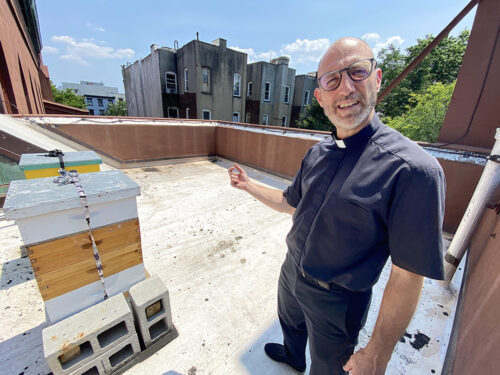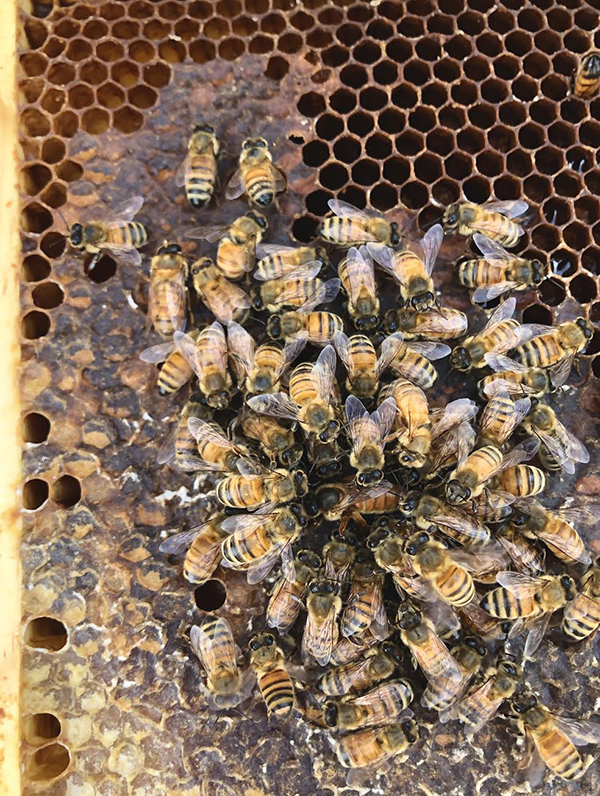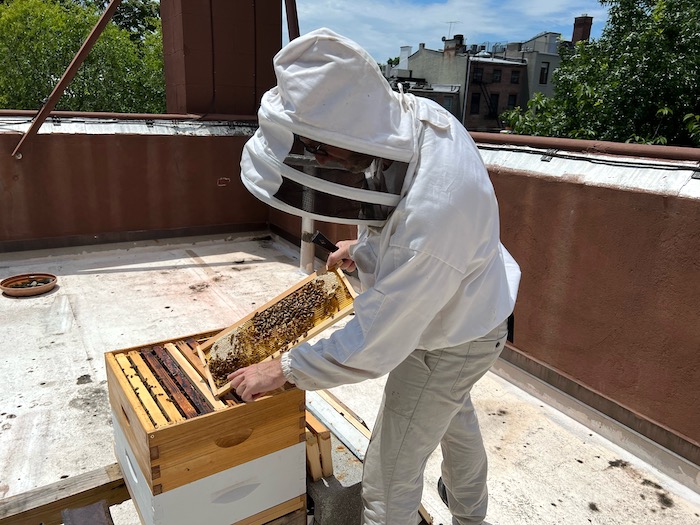
COBBLE HILL — The term “domestic engineer” applies to a stay-at-home parent or person tasked with various homemaking duties — much like a worker bee in a honey-producing hive.
Father Alexandre Morard, an amateur beekeeper, has learned the routine of honey bees while tending hives on the roof of the rectory at St. Paul Church.
For example, he said, worker bees are domestic servants that clean the hive and serve as nursemaids to newborn larvae. They also pull “guard duty” for the queen and forage pollen and nectar to feed the entire colony.
Father Morard said worker bees do more than domestic engineering. They are, he explained, construction engineers with built-in abilities to design honeycombs of same-sized hexagonal cells, and custom-make them to fit any space.
But, as one of nature’s ultimate multitaskers, a worker bee literally labors herself to death, Father Morard said. Her lifespan is about six weeks. By contrast, the male “drone” bees last a few weeks longer, and the queen can live a couple of years.
“It’s really quite amazing,” Father Morard said. “When you see how they communicate, and how they work in pattern with the queen, you ask, ‘How can evolution bring this?’ ”

It can’t, he said, but God can.
Father Morard, who is from Switzerland, is parochial vicar of St. Paul and St. Agnes Parish, which spans Carroll Gardens and Cobble Hill.
He was ordained in 2012 and became incardinated last month in the Diocese of Brooklyn. He has a background in construction, so he enjoys working with tools to repair or refurbish the churches.
Father Morard also grew up being outdoors, and became adept at hiking, rock climbing, and skiing.
The priest was serving in the town of Woodbourne in upstate New York when a friend, who was a long-time beekeeper, had reached retirement age and was trying to downsize his belongings.
He offered Father Morard all of his beekeeping gear, including hive boxes, tools, and protective clothing.
The priest accepted the kit, but with absolutely no knowledge of what to do with it.
Father Morard began studying the care and management of bee colonies, but it began as a casual endeavor, reading books and mining websites.
Then, in 2018, he was invited to consider working in the Diocese of Brooklyn. The possibility of living in New York City challenged him to consider how he’d feed his hunger for nature.
“I can’t stay in my room or office all day long, just reading books,” he said. “I’m from the countryside and I need nature — some outdoor activity or physical activity.”
Subsequently, his interest in beekeeping accelerated. He posed an “unusual question” to Msgr. Joseph Nugent, then the pastor of St. Paul Parish.
“I asked if I could have bees here,” Father Morard recalled. “And he said, ‘Oh, yes. Why not?’ ”
That settled, Father Morard still had much to learn.
He consulted local beekeepers. They advised him how to set up the hive boxes on the rectory roof, and how to attract the bees needed to form colonies and produce honey.
Father Morard, being handy with tools, was more concerned about whether he could afford the hobby, both financially and in terms of time commitment.
“It’s a hobby,” he said. “But I’m not a professional beekeeper. I’m a priest.”
Still, as he moved forward, Father Morard learned beekeeping was manageable with no major constraints on time or finances.
He sells honey, but not for profit. Proceeds benefit Con-solatio, a Brooklyn-based nonprofit organization that Father Morard helps serve.
Rooted in the Catholic faith, Con-solatio “ministers to people from every walk of life, especially those most socially isolated, in some of the world’s most troubled areas,” according to its website.
Bees, however, have also reaffirmed to Father Morard the majesty of God’s creation.
Beekeeping, he concluded, is “a way to worship or to praise God for this beauty, because it is so beautiful.”

